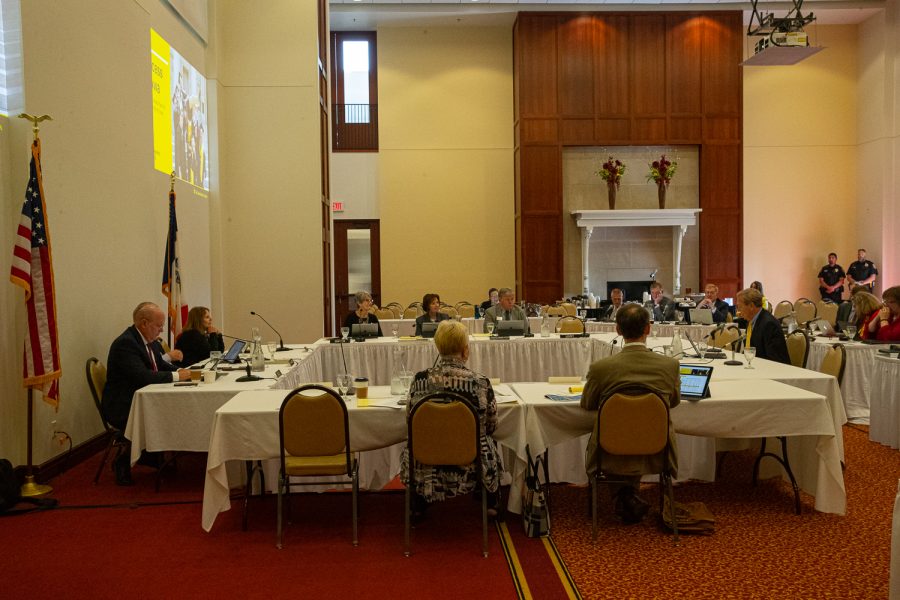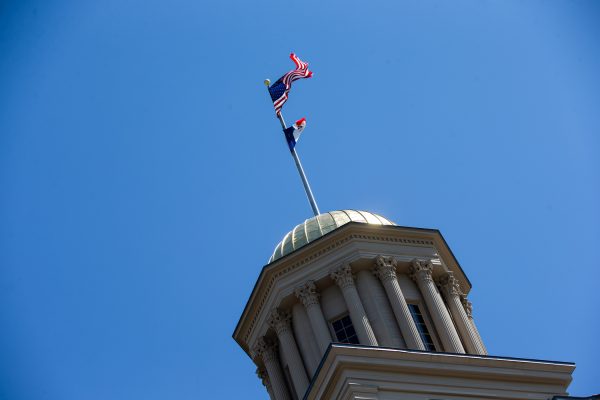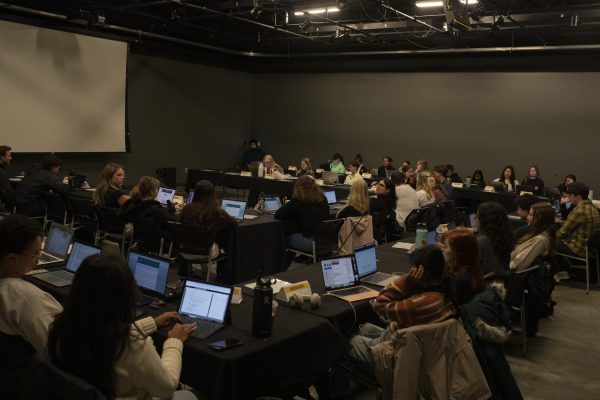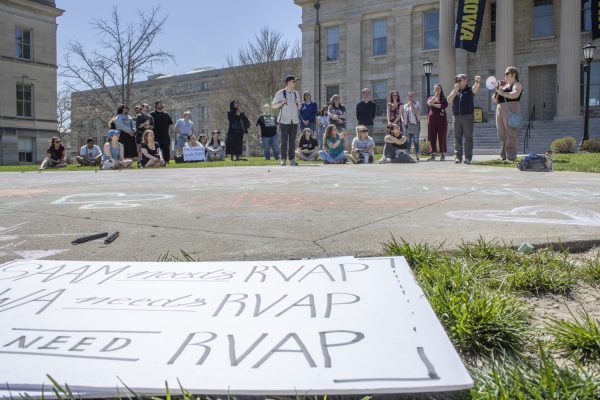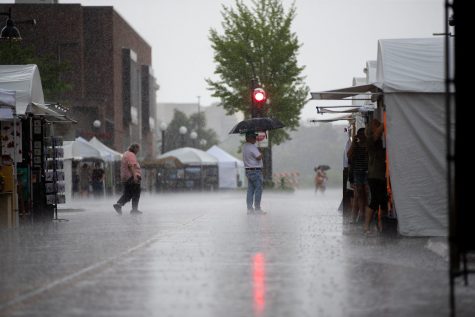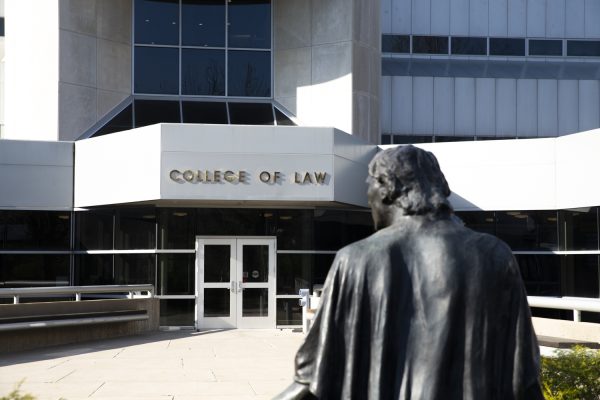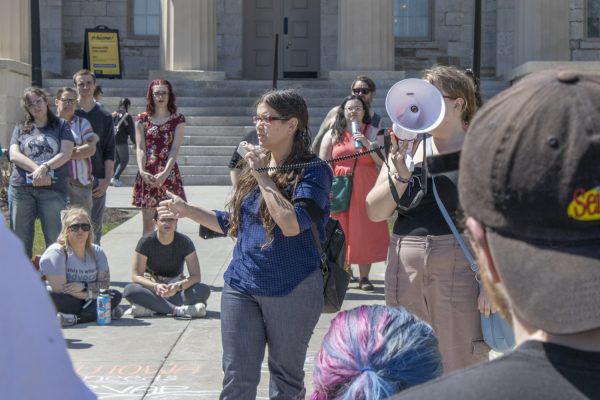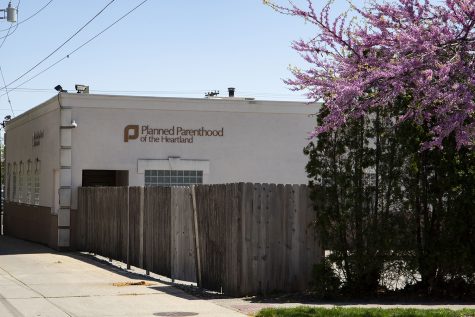Leaders from state universities update regents on COVID-19 impact on students
Leaders at the institutions governed by the state Board of Regents gave a presentation on how students have adjusted to life during the novel-coronavirus pandemic in a virtual meeting Thursday.
University of Iowa President Bruce Harreld addresses the Board of Regents during a meeting at the Iowa State Alumni Center in Ames, Iowa, on Thursday, June 6, 2019.
June 4, 2020
Leaders from the institutions governed by the state Board of Regents surveyed students to understand how they are adjusting to learning in new environments and what measures can be taken to help them. The survey found that students were taking advantage of online resources provided to assist those who may have been struggling with the transition.
The vice presidents for student life and affairs from the University of Iowa, Iowa State University, University of Northern Iowa, and the Iowa School for the Deaf gave a presentation on student experiences during the COVID-19 pandemic in a regents meeting Thursday.
The presentation shared the feedback each institution received from students, the adaptations and innovations that have been implemented on each campus amid COVID-19, and how students are getting involved and giving back to their respective communities off campus.
Although the institutions collected their feedback and data in different ways, the feedback they received was consistent, ISU Senior Vice President for Student Affairs Martino Harmon said.
The group learned that students were meeting with their advisors, were aware of IT resources and virtual academic support, were using virtual health and wellness resources, were aware of pass/non-pass policies, and had neutral to positive assessment of their own well-being, Harmon said.
This data allowed personnel at each university to check in with students who reported they were not doing well and understand how many students weren’t meeting with advisors, he added.
Even though students were no longer on campus in classrooms and living spaces, Harmon said, they were still able to connect with their peers and instructors.
Students reported that they appreciated the transparency of online instruction, he said, and recognized the impact that faculty had in transitioning everything to a virtual format.
“It’s not all peaches and cream — some students talked about the difficulty [of] getting motivated, juggling life at home, [and] learning amidst different distractions that they may have in their home environment,” Harmon said.
Other students reported being able to focus on their schoolwork more without the distractions of being on campus, he said.
Students asked to receive social-media updates, for instructors take the time to record lectures, for academic and tutoring services and financial support to be made available, and for faculty to be flexible with deadlines, Harmon said.
Harmon and UI Vice President for Student Life Sarah Hansen acknowledged that students’ lives are now more complicated with protests currently taking place nationwide in response to the death of George Floyd.
RELATED: Police use tear gas and flash-bangs on protestors marching toward I-80 in Iowa City Wednesday night
Hansen acknowledged that flash-bangs and tear gas were used on protesters during peaceful protests in Iowa City Wednesday night.
“Of course our students’ lives and safety are at the center of the work we do, so I want folks to know that we’re working very urgently with the City of Iowa City and a variety of our partners on the events of last night and next steps,” Hansen said.
Hansen also discussed the impact the pandemic has had on the mental health of students. Students reported a variety of different challenges mentally and fiscally due to the suddenness of the transition to virtual learning, she said.
A lot of ritual making such as walking across the stage at graduation and completing the first of four finals weeks with friends in the residence halls was lost, she said.
Telehealth and wellness were still utilized by students, Hansen said, and the UI worked to make sure students could still access mental-health services across state lines. Student award ceremonies were also well attended when transitioned to an online format, she added.
The UI offered virtual mental-health panels for students, faculty, and staff to attend during the semester, Hansen said. These panels were successful enough that the UI is continuing them into the summer.
Engagement efforts by the UI have continued as students moved off campus, Hansen said. The cultural centers had ongoing programming and engagement, academic advising and supplemental support moved to Zoom. Disability accommodations were also managed well virtually, she said.
“All of these I think have provided us with really helpful ways to continue to help students feel supported and a part of our campus communities,” Hansen said. “And in addition, thinking of fall, they give us some insight into how we can continue to deliver services in ways that don’t always require students to be with us in person.”
UNI Vice President for Student Affairs Paula Knudson discussed the work students have been doing in their community since campus and businesses closed.
RELATED: On Iowa, go home: University of Iowa students move out of residence halls
UI Student Allie Stutting created an organization called Iowa City Errand-ers to help the elderly and community members with compromised immune systems obtain groceries and other necessities during the coronavirus pandemic, Knudson said.
Students at ISU have created masks and face shields for hospital workers, she said. At UNI, the men’s glee club put on virtual performances for those missing theater since the implementation of social-distancing guidelines, and the Panther Pantry has given out food packs with a month’s supply of food to students in need, Knudson said.
Regent institutions plan to reopen their campuses in the fall for in-person instruction, open residence halls, open dining halls, on-campus dining, and campus activities, Regent President Mike Richards said.
“There are many details to be worked out both inside and outside the classroom,” Richards said. “When our campuses open, we plan to have a full range of open campus experiences as possible, including athletics.”
Each institution has formed a committee to determine how campuses can be reopened safely and effectively in the fall, he said. These committees will determine how the institutions will operate in the COVID-19 environment. When plans are finalized, Richards added, each institution will communicate their plan publicly.
The regents have also established an advisory group made up of four regents and representatives from each university, he said. Its goal is to look for collaborative opportunities on academic and administrative levels across regent institutions.
“Public higher education was already evolving before COVID-19,” Richards said, “but with the added pressure of the pandemic, we must begin to make systemic changes now.”



